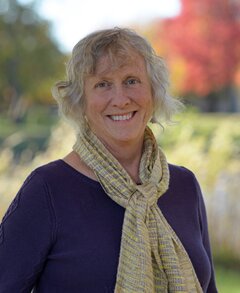Biography
Ann-Perry Witmer is a Research Scientist at the Illinois Applied Research Institute. After earning her undergraduate degree in Civil and Environmental Engineering at the University of Illinois, Dr. Witmer designed drinking-water systems throughout the Midwest as a professional consulting engineer for more than a decade. During that time, she also became involved in humanitarian engineering work, ultimately helping to create service organizations that designed and installed engineered infrastructure with communities in Central America and the Caribbean. Dr. Witmer returned to the University in 2013 as a lecturer in the Grainger of College of Engineering and continued to teach while earning her doctoral degree in Agricultural and Biological Engineering, focusing her studies on the effectiveness of engineering design for non-industrialized societies. She continues to teach courses in international engineering design and acts as faculty advisor to Engineers Without Borders-UIUC, and her project travels have taken her to Central America, Africa, Asia and South America, where she’s developed a deep understanding of the relationship between technical and social considerations that must be co-evaluated for under-resourced communities. Many of her insights were gleaned from a first career in journalism, during which time Dr. Witmer built a robust understanding of the relevance of context to applied efforts in government, industry, and the environment.
Today, her research effort focuses on the refinement of the Contextual process methodology, in which user conditions are incorporated into the design process to produce a more sustainable outcome. Her methodology has been applied to engineering design processes for infrastructure and products, as well as to entrepreneurial pursuits and business management practices.
Research Interests
- Parsing the urban-rural divide to address health needs in agricultural communities
- Leveraging context in addressing interactions between land, people, and environmental practices
- Applying context to engineering processes in the industrialized world - finding the nuances of societal differences in rural America
- Measuring context using observation-based tool - best practices for using the Contextual Tool
- The infrastructure client experience in non-industrialized societies - enthographic evaluation of the indigenous society experience
- Learning from a society's innovative self-sufficiency to build a robust and sustainable technical infrastructure
- Humanitarian v. Contextual Engineering project inception - do practitioner objectives and motives affect outcome?
- Context and entrepreneurship - when does user context begin to influence product development?
- Contextual Engineering application to remote power systems design
- Can big data be used to predict contextual conditions for rural societies?
- Building a contextual understanding among engineering students through project-based learning
- The impact of rurality and indigenous identity on technical decision-making in non-industrialized societies
Education
- Ph.D. Agricultural and Biological Engineering, University of Illinois, 2018
- M.S., Civil Engineering (SRIS), University of Illinois, 2016
- B.S., Civil/Environmental Engineering, University of Illinois, 2002, highest honors
- B.A., Art History, Boston University, 1982, Magna Cum Laude
- B.S., Journalism, Boston University, 1982, Magna Cum Laude
Additional Campus Affiliations
Teaching Associate Professor, Biomedical and Translational Sciences
Teaching Associate Professor, Agricultural and Biological Engineering
Instructor, Agricultural and Biological Engineering
Lecturer, Electrical and Computer Engineering
Research Affiliate, Institute for Sustainability, Energy, and Environment
Teaching Associate Professor, Center for Global Studies
Affiliate, Center for Latin American and Caribbean Studies
Affiliate, Center for the Study of Global Gender Equity
Affiliate, Social & Behavioral Sciences Institute
Recent Publications
Kandume, J. N., Witmer, A.-P., & Asensio, C. M. (2026). Contextual Engineering for Sustainable Kalahari Melon Oil Extraction in Rural Namibia. AgriEngineering, 8(2). https://doi.org/10.3390/agriengineering8020060
Chattopadhyay, A., & Witmer, A. P. (2025). Practical energy equity decision making in resource-constrained communities: A case study in the Navajo Nation. Electricity Journal, 38(1), Article 107456. https://doi.org/10.1016/j.tej.2025.107456
Khalid, M. T., Velapatiño Benito, M., Rzonca, A., & Witmer, A. P. (2025). An Introduction to “Alternative Fuel Grades” for Electric Vehicle Fast Charging. Electricity, 6(4), Article 62. https://doi.org/10.3390/electricity6040062
Khalid, M. T., & Witmer, A. P. (2025). Prompt Engineering for Large Language Model-Assisted Inductive Thematic Analysis. Social Science Computer Review, Article 08944393251388098. Advance online publication. https://doi.org/10.1177/08944393251388098
Lawson-Bulten, E., Rasoulian, M. F., Ortiz, X. E., & Witmer, A. P. (2025). Building Stakeholder Relationships for Technical Interventions with Indigenous Populations. In 2025 IEEE International Humanitarian Technology Conference, IHTC 2025 (pp. 49-54). (2025 IEEE International Humanitarian Technology Conference, IHTC 2025). Institute of Electrical and Electronics Engineers Inc.. https://doi.org/10.1109/IHTC65087.2025.11216303
